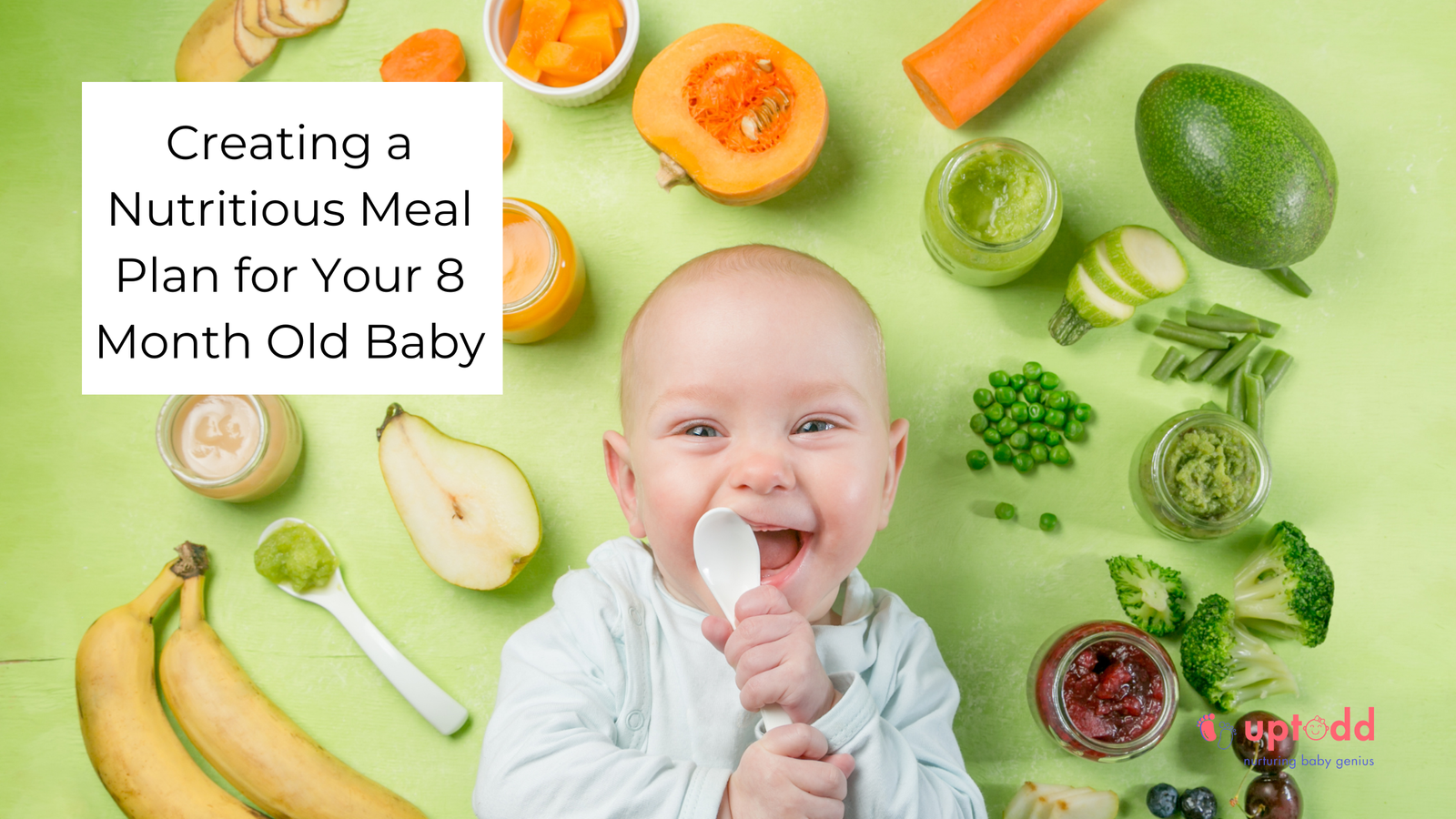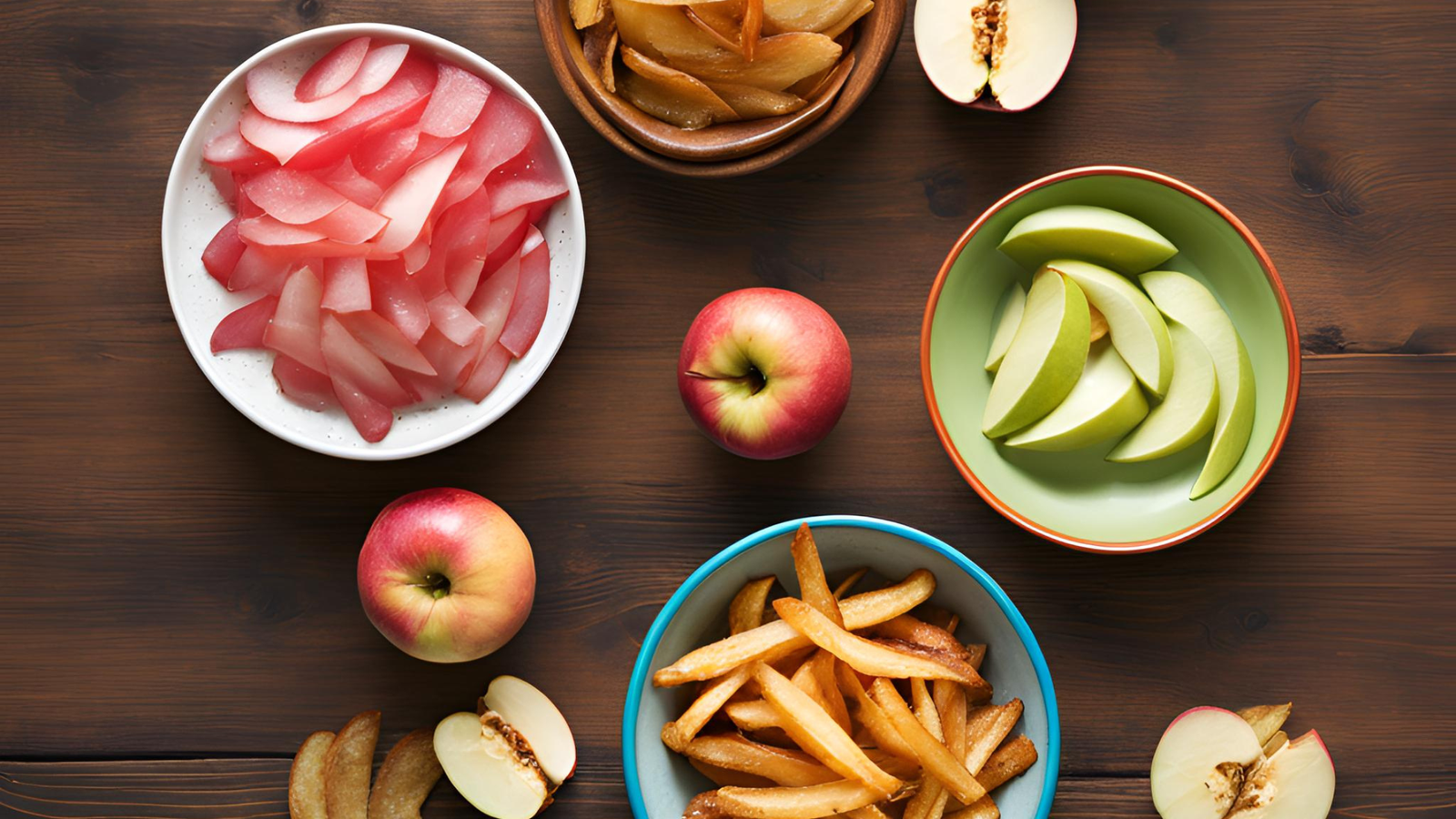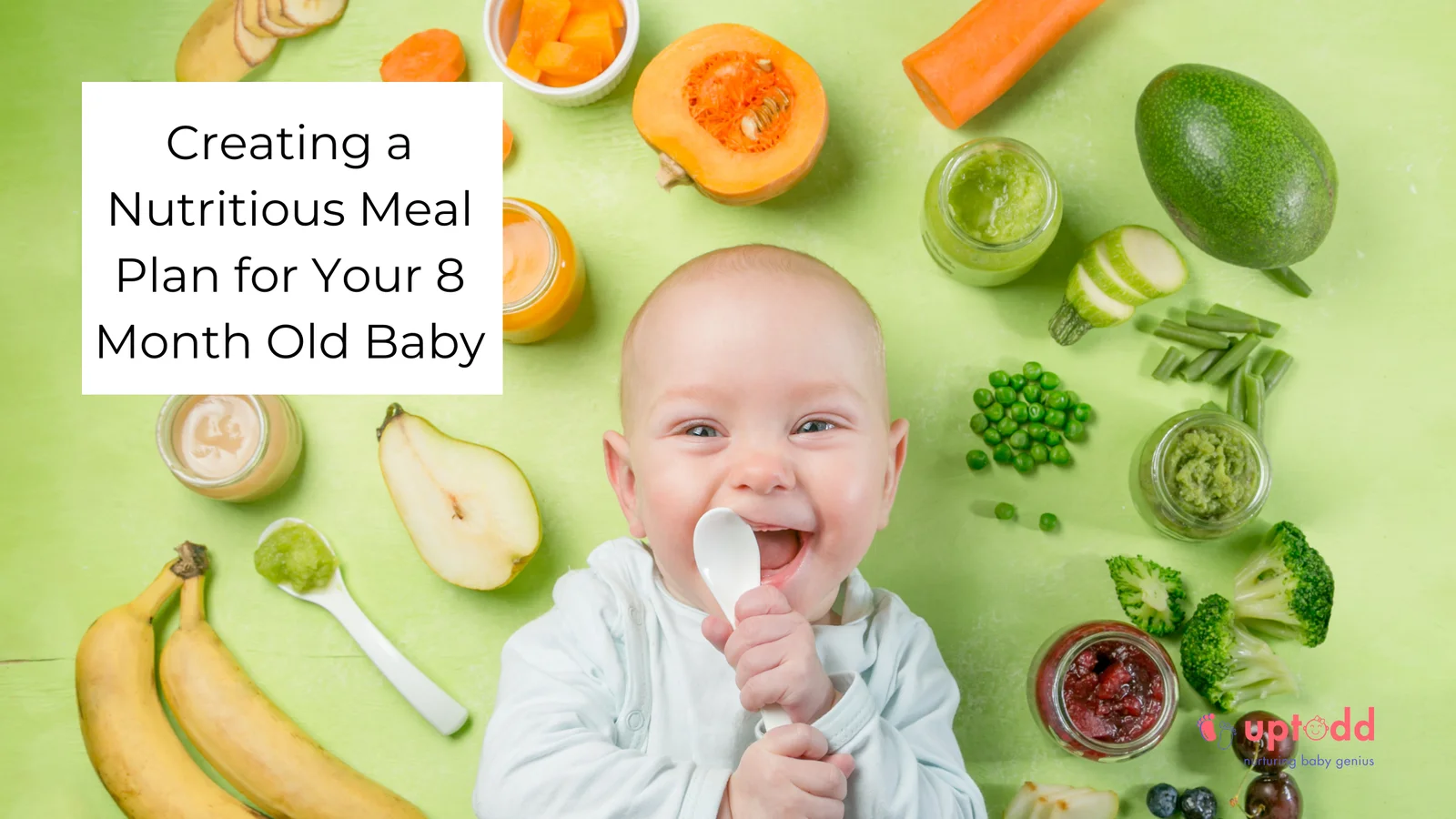
As parents, the primary concern is to feed the babies accurately. Besides, as the baby matures to the age of 8 months, the baby has to be given foods that meet the developing nutritional necessities. Now this is a confusing part right? With the help of UpTodd’s crafted food chart and a comprehensive guide, you can create a nutritious meal plan that supports your baby’s growth and development. This blog will guide you through the process of creating a balanced meal plan for your 8-month-old baby. This blog along with 8 Month baby food chart will cover-
- Nutritional Requirements at 8 months
- What can you feed now?
- 8 Month baby food chart
- Precautions to take
So now first off all let us begin with Nutritional Requirements at 8 months
Nutritional Requirements at 8 months
As your infant learns to eat solid foods, meal preparation becomes more complicated to satisfy their increasing nutritional requirements. At eight months, your infant needs roughly 750-900 calories per day, with 400-500 calories coming from breast milk or formula (about 24 ounces/720 mL per day). These continue to contain critical vitamins, minerals, and brain-boosting substances.
In addition to calories, your infant requires:
- Iron: 11 mg per day to promote brain growth and avoid anemia. Include iron-fortified cereals, pureed meats, and lentils.
- Calcium: 200 mg per day to maintain strong bones and teeth. Found in yogurt, cheese, and fortified cereals.
- Protein: Approximately 11 grams each day for growth and muscular building. Combine eggs, cottage cheese, Greek yogurt, and pureed chicken.
- Vitamin C: 40 mg per day to improve iron absorption and promote immunity. Include mashed citrus fruits, strawberries, or cooked tomatoes.
- Healthy fats are necessary for brain development. Offer avocado, olive oil.
- To encourage chewing, use somewhat coarser textures such as yogurt, oatmeal, mashed banana, mashed potatoes, or lumpy pureed veggies. Nutritious additives such as scrambled eggs, cottage cheese, and avocado give balanced nutrition, allowing your baby to grow strong and flourish.
Reference- Healthy Children
What can you feed now?

When your baby turns 8 months of age it is time when you can introduce soft finger foods along with purees, breastmilk and formula milk. At this point, your baby’s physical development, which includes enhanced hand-eye coordination and the ability to sit up, prepares them to explore new textures and more complex feeding experiences. Finger foods can now be introduced with purees, breastmilk, and formula.
Soft finger meals are small, easy-to-hold food slices that help your baby learn to self-feed and build fine motor skills. Soft, steamed veggies (carrot, sweet potato, peas), small pieces of soft fruit (banana, avocado, watermelon), and small slices of toast are excellent options. These foods help your baby learn to grab, hold, and bring food to their mouth, which is a necessary ability for future eating habits.
Can breastmilk/ formula milk be excluded?
Despite the introduction of finger foods, breast milk or formula remains a significant element of your baby’s diet, providing essential minerals like calcium, iron, and vitamins. At 8 months, your baby still needs breast milk or formula as their primary source of nutrition, but solid foods are becoming an important supplement, increasing their overall calorie and nutritional intake.
To reduce choking dangers, keep finger foods mushy and chopped into small, manageable pieces. Gradually introducing these meals not only helps your baby’s dental growth and chewing skills, but it also enhances their confidence and independence during mealtime.
Now let us talk about 8 Month baby food chart –
8 Month baby food chart
| Time | Meal Type | Food Options | Quantity |
| Morning Upon Waking | Breastfeeding/Formula | – | 1 Session |
| Breakfast (8:00 AM) | Meal 1 | – Scrambled egg (1 small egg)- Mashed banana (2–3 tbsp)- Oatmeal (2–3 tbsp) | 2–3 tbsp |
| Mid-Morning (10:30 AM) | Breastfeeding/Formula | – | 1 Session |
| Lunch (12:30 PM) | Meal 2 | – Rice and lentil khichdi (2–3 tbsp)- Steamed and mashed carrots and peas (2–3 tbsp)- Soft fish or chicken (mashed) | 2–3 tbsp |
| Afternoon (3:30 PM) | Snack | – Mashed avocado (2–3 tbsp)- Soft fruit pieces (apple, pear, or watermelon) | 2–3 tbsp |
| Evening (5:30 PM) | Breastfeeding/Formula | – | 1 Session |
| Dinner (7:00 PM) | Meal 3 | – Soft vegetable soup (2–3 tbsp)- Mashed potatoes with peas (2–3 tbsp)- Greek yogurt (2–3 tbsp) | 2–3 tbsp |
| Night (9:00 PM) | Breastfeeding/Formula | – | 1 Session |
| Before Bed | Breastfeeding/Formula | – | 1 Session |
Reference- 8 month baby Food
Since now you know what to feed and when let us talk about some important safety precautions-
Safety Tips
- To monitor for allergies, introduce only one new food at a time, every 3-5 days.
- Make sure the food textures are acceptable for the baby’s ability to chew and swallow.
- Continue to breastfeed as the primary source of sustenance, with foods offered as a supplement.
- To avoid choking dangers, make sure the meal is mushy and mashed.
- Because babies’ kidneys are still developing, avoid adding salt to their diets.
- Avoid sugary snacks and desserts, as they might raise the risk of early childhood cavities and promote bad eating habits.
- While yogurt and cheese can be had in moderation, cow’s milk should be avoided until after 12 months.
- Ensure that dairy products such as yogurt are unsweetened.
Conclusion
Your baby is about to try some more of the more exciting finger foods, soft finger foods, and purees with more texture. Continue nursing or formula feeding while introducing solids to ensure your baby receives adequate nutrients for growth and development. Offering little ones a well-balanced diet rich in fruits, vegetables, proteins, and healthy fats can help them develop their physical, cognitive, and motor skills. Preventing choking dangers and allergic responses will now pave the way for the development of good eating habits and self-feeding skills.




Leave a Reply